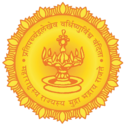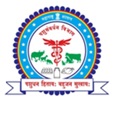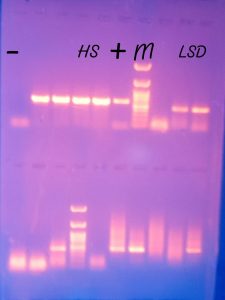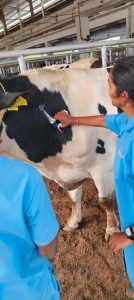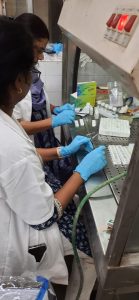Bharatratna Atal Bihari Vajpayee Western Region Disease Diagnosis Laboratory / Disease Investigation Section
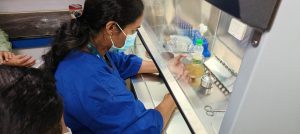 Animal health is the backbone of the livestock industry. Any disease outbreak leads to huge economic losses through mortality and loss of productivity. In fact, the National Commission on Agriculture was emphatic in its observation that “Livestock development programs cannot possibly succeed unless and until well-organized animal health service is built up and protection of livestock against diseases and pests, particularly against the deadly infectious one’s is assured”.
Animal health is the backbone of the livestock industry. Any disease outbreak leads to huge economic losses through mortality and loss of productivity. In fact, the National Commission on Agriculture was emphatic in its observation that “Livestock development programs cannot possibly succeed unless and until well-organized animal health service is built up and protection of livestock against diseases and pests, particularly against the deadly infectious one’s is assured”.
Objectives of Disease Investigation Section
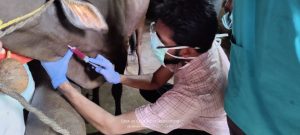
- Collection of proper biological samples from outbreaks.
- Process Material for investigation and differential diagnosis of diseases by specialists.
- To confirm outbreaks in livestock and Poultry.
- To advice control measures to field staff. To carry out toxicological investigations and advice the field staff regarding the treatment.
- To investigate known and unknown diseases prevailing all over the State
- Testing of animals for a screening of livestock and poultry diseases of National importance like Tuberculosis, Johnes Disease, Brucellosis, Salmonellosis etc for systemic control of these diseases.
- Aware Regional, District laboratories and field staff about burning problems of Livestock and Poultry by conducting seminars, training and sending circulars.
- To issue animal health certificates for export of livestock and livestock products including poultry.
- To undertake sero-monitoring of animals against certain diseases like IBR. Brucellosis, P.P.R., etc.
- To undertake the epidemiological investigation and economic analysis of the disease outbreaks.
Functions
Western Regional Disease Diagnosis Laboratory
Government of India, New Delhi has awarded the status of Western Regional Disease Diagnosis Laboratory (WRDDL) to the Disease Investigation Section, Aundh, Pune- 67. According to this status, the jurisdiction of this organization includes the states of Maharashtra, Goa, Diu-Daman, Dadra-Nagar-Haveli, Madhya Pradesh, Gujarat and Chhattisgarh. Funds for this are received from the central government. 28 officers/employees work for these laboratories.
From this scheme, diagnostic work to control important diseases and disease survey are carried out which helps the state in planning for disease control. In result of this ultimately the farmers get benefit and the economic loss remains minimal. Here, the tests for sexually transmitted diseases are conducted and the results are reported to the semen collection institutes. This helps to control the spread of sexually transmitted diseases through artificial insemination, thus, reducing the incidence of disease and lowering the financial losses of livestock owners.
Objectives of Western Regional Disease Diagnosis Laboratory
Surveillance of samples during the outbreaks
- Acting as a reference laboratory for the states in the western part of the country for bacterial, viral, parasitic and other important diseases causing economic losses.
- To collect information about diseases in western states and provide it to other states.
- Preserving classified bacteria, viruses and parasites and sending them to national level laboratories as required for further research.
- Validation of recognized tests for diagnosis and sharing information of these tests to laboratories in other states.
- Providing diagnostic training to laboratory officers of other states.
- Conducting trials for control of important diseases causing heavy economic loss like tuberculosis, Jones Disease, IBR and Salmonellosis in poury
- Surveillance of diseases specified by Government of India, Department of Agriculture, Department of Animal Husbandry etc e,g, Surveillance of diseases like BSE/Scrapie
ASCAD
A) Surveillance of Bird Flu
B) Surveillance, Monitoring and Disease Forecasting
- ADMAS Scheme: Sero-monitoring of diseases and Analysis of scientific information of disease transmissions
- ICAR Coordinated Research Center on Foot and Mouth Disease.

